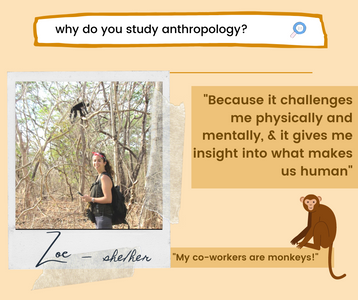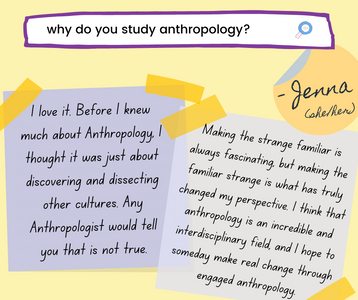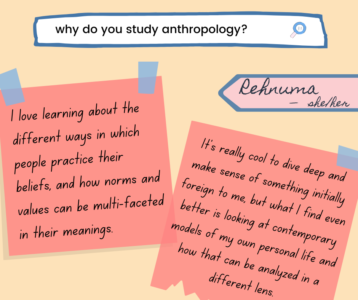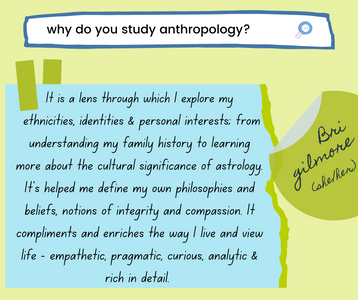 “I kept learning things I didn’t even consider, like the different ways that people order their life, and understand time, and understand space. And from gaining those perspectives I came to really understand anthropology as something that could form and frame the way that I experience the world… and the impact I have on other people.”
“I kept learning things I didn’t even consider, like the different ways that people order their life, and understand time, and understand space. And from gaining those perspectives I came to really understand anthropology as something that could form and frame the way that I experience the world… and the impact I have on other people.”
–Kendall Castañeda, BU CAS ‘21
Anthropology sits at the intersection of the social sciences, natural sciences, and humanities. A degree in anthropology not only allows students to understand human experience across time and space but also to rigorously interpret and analyze those understandings. Our students develop valuable skills in research, data collection, analysis, and writing that are applicable to a variety of careers in teaching, business, public service, medicine, and much more.
Learning Outcomes for Anthropology Majors
- Develop an appreciation for the diversity of human cultures and the principles and methods that anthropologists employ for studying them.
- Master the fundamental cultural themes in at least one society other than their own and the relationship of those themes to the dynamics of social organization.
- Recognize and be able to describe human linguistic diversity, as well as the shared properties of all languages that are associated with the unique capacities of our species.
- Understand the biological principles and historical contingencies that explain and govern the deep history of humanity as revealed by the findings of paleontology and archaeology.
- Grasp the fundamental laws and processes of heredity and evolution and their implications for individuals and populations.
- Students in the social and cultural anthropology track will additionally be able to articulate and act on a more focused understanding of one or more topical areas, which may include the cross-cultural study of law, politics, economic systems, psychology, or medical systems. They will demonstrate an ability to relate theory to empirically grounded research that will help to equip them for an era of globalization in which they will need to understand and interact with societies and cultures beyond their own.
- Students in the biological anthropology track will additionally be expected to demonstrate a basic theoretical and practical understanding of some aspect of the evolutionary biology, functioning, and pathologies of the human body and of the biological factors that underlie, impact, and constrain nutrition, reproduction, and behavior in humans and other primates.
Anthropology as a Career
Anthropological study provides training particularly well suited to the 21st century. Our economy will become increasingly international; workforces and markets, increasingly diverse; participatory management and decision making, increasingly important; communication skills, increasingly in demand. Anthropology is the only contemporary discipline that approaches human questions from historical, biological, linguistic, and cultural perspectives. U.S. News Today ranks “Anthropologist” as one of its Best Science Jobs, while the Bureau of Labor Statistics estimates 10% employment growth for anthropologists within the next decade. Learn more about the different career opportunities available to anthropology majors below.
Academia
Nonprofit Organizations and Government
Corporations
To learn more about our undergraduate and graduate alumni and their career paths, click here. For more information on further career opportunities for anthropologists, visit the American Anthropological Association’s (AAA) career center.










